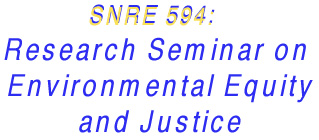

| Department: | School of Natural Resources and Environment | ||
| Division: | 711 Section 001 | ||
| Course Number: | 594 | ||
| Term(s) offered: | Winter | ||
| Credit Hours: | 3 | ||
| Time: | Tuesday and Thursday 7:00-9:00pm | ||
| Instructors: | Bunyan Bryant and Elaine Hockman |
Government agencies at all levels are collecting information for data analysis in order to make informed policy decisions. Public demands on federal, state, and local agencies for information on polluted air, water, food, soil, dust, and their possible health effects are increasing, particularly as thousands of new chemicals find their way onto the market. This information has been of value in agency decision-making, yet a considerable amount of this information is never analyzed. Agency personnel seldom have the time or the interest to exhaust the analysis of their data bases. Often the more pressing problems of policy implementation and enforcement take precedence over data analysis. We, at the University of Michigan, believe we can provide a service to government agencies and to graduate students and faculty interested in improving their analytical skills.
The development of a course on race, class factors, and the disproportionate impact of environmental hazards on certain communities will hopefully be an integral part of an environmental equity program here within the School. For the last three years computer information from the state of Michigan on toxic release inventory (TRIs) citations, Act 307 and SuperFund sites, Leaky Underground Storage Tanks (LUSTS), commercial hazardous waste facilities, MEAP test scores of all the children in the state of Michigan by school, and by zip codes, and census data for the state of Michigan have been down loaded on Macintosh hard drives. These data bases have been merged, organized, and are ready for analysis. Although the focus of this seminar is upon data analysis, a considerable portion of it will deal with analytical constructs to help students with their understanding of environmental justice and to help them formulate and test hypotheses.
In this seminar we expect students to make several contributions at different levels in order to enhance their own learning as well as the learning of their peers. Because students are assigned different articles, we expect them to be read and reported on in class. Therefore, class attendance is important.
In addition, students are expected to co-author papers with faculty for a chapter in a book or for a peer review journal. For the book we want to use former student Kathy NemsickÕs paper, as a conceptual model to apply to other communities, such as, Highland Park, Saginaw, Romulus, Detroit, and Grand Rapids. The papers will have two parts: 1) qualitative analysis. Students are expected to face-to-face interviews with people affected by environmental hazards, and 2) quantitative analysis: students are expected to apply statistical models to the data set. Also, every two weeks students will have a check point for progress. The first draft of the paper will be due on March 28th. Prior to the first draft students should discuss their hypotheses and method of analysis with instructors.
Why is this seminar important? Although the debate on environmental equity and justice is intensifying in both lay and professional communities, there is very little quantitative data to support the thesis that communities of color are impacted disproportionately by environmental hazards. Much of the debate is based upon anecdotal comments or based upon debates to challenge varying levels of proof or causality. We feel this seminar can contribute to that debate by providing quantitative analysis of data collected by government agencies. Our analysis of the data will enhance the awareness of both policy makers and lay people. This in turn will perhaps lead to changes in policy or perhaps it will illustrate the need for further environmental justice research in various areas of environmental justice.
This seminar will focus on graduate students with quantitative skills--skills to allow them to do sophisticated data analysis. Students will be carefully selected; the prerequisites for this course is a good foundation in introductory statistics. The purpose of the seminar is as follows:
To help students increase their quantitative and analytical skills and their awareness of environmental justice issues.
To provide opportunities for faculty and students to become co-authors of papers for peer review journals.
To provide opportunities for students to learn about the differential impacts of toxic exposures on low-income and minority communities.
To provide opportunities for students to learn about the process of proposal writing.
Expectations: Students are expected to have quantitative skills and some knowledge of computers and computer programs. Students will attend lectures and participate actively in seminar discussion. Reading assignments need to be completed before class. Students are expected to do hypotheses testing by applying the appropriate statistical models. Students in turn are to report on their preliminary findings in class, and write and critique each other's final papers. While students will be assigned different readings to report on in class, it is important that they give full attention to the contents of the articles. Your classmates will be dependent upon you to give informative and concise reports. Students will have to consolidate the readings in order to report on the main points within five to 8 minutes.
Back to the Courses Page